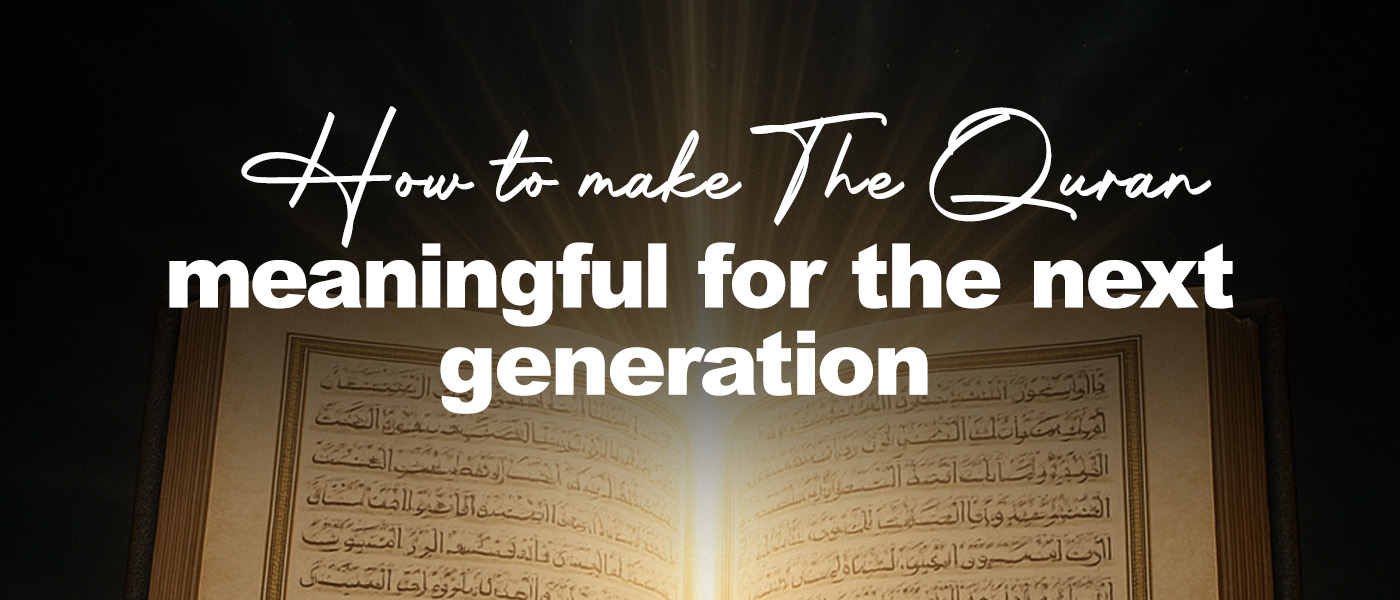In today’s digital era, young Muslims face a unique set of challenges such as identity confusion, peer pressure, mental health struggles, and an overwhelming sense of information overload (through media consumed on social media for long hours). Amid these pressures, many youth feel increasingly disconnected from The Quran. To them, it may appear distant, difficult to understand, or simply not relevant to their daily lives. Yet for those who go out of their way to learn, study, and reflect upon The Quran, it remains exactly what it has always been, which is a divine source of comfort, truth, and guidance. The challenge, then, is not in The Quran itself, but in how it is introduced and experienced. The key to helping youth fall in love with The Quran lies in reintroducing it not as a textbook of rules, but as a personal companion and a mirror for the soul.
Reframing The Quran Beyond Memorization
One of the most common approaches to The Quran in traditional environments is emphasizing memorization, often without ensuring comprehension. While memorizing The Quran is a noble and sacred endeavor, it is rarely transformative unless paired with meaning. Youth who recite verses without understanding may begin to see The Quran as a ritualistic obligation rather than a source of insight. To change this, we must prioritize comprehension. Encouraging young Muslims to read The Quran alongside a trusted translation helps them see that The Quran speaks directly to their reality offering counsel, encouragement, and moral clarity.
When a young person reads verses such as, “Surely with that hardship comes more ease,” (The Clear Quran®, 94:6) or, “Say, O Prophet, that Allah says, ‘O My servants who have exceeded the limits against their souls! Do not lose hope in Allah’s mercy, for Allah certainly forgives all sins. He is indeed the All-Forgiving, Most Merciful,’” (The Clear Quran®, 39:53) they begin to internalize The Quran as a source of emotional and spiritual healing. This shift, moving from memorization without meaning to understanding with reflection, can reframe the entire relationship a young person has with The Quran.
Breaking the Association with Restriction
Many youth today associate The Quran with restriction, meaning people only highlight the long list of obligations and prohibitions that are kept within it. While The Quran does contain divine law, it is, at its core, a conversation between the Creator and His creation. It speaks to the Prophet (SAW) in moments of despair, it addresses humanity’s doubts and fears, and tells stories of those who struggled and overcame. When youth are taught that The Quran is filled with love, mercy, and practical wisdom, not just commands, they begin to read it with curiosity rather than hesitation.
By presenting The Quran as a living dialogue, we allow young Muslims to feel personally spoken to. They discover that The Quran doesn’t shame them for their struggles, but gently redirects them with compassion and purpose. This emotional accessibility is key to building a relationship that goes beyond obligation and grows into love.
For The Quran to truly impact the hearts of the youth, it must be presented in a way that is relevant to the emotional and moral challenges they face. Whether it is dealing with social media pressure, struggling with self-worth, facing loneliness, or grappling with past sins, The Quran has beneficial advice to give. Stories of prophets who were rejected, verses that remind us of Allah (SWT)’s mercy, and reflections on the shortness of this life are not abstract teachings, they are divine answers to modern questions.
The Power of Relevance: Modern Lessons from Ancient Texts
For example, youth experiencing social interaction can find comfort in the story of the young men of the cave (Surah Al-Kahf), who withdrew from a corrupt society to preserve their faith. Those weighed down by guilt can be uplifted by the verse, “‘O My servants who have exceeded the limits against their souls! Do not lose hope in Allah’s mercy, for Allah certainly forgives all sins. He is indeed the All-Forgiving, Most Merciful,’” (The Clear Quran®, 39:53). These verses resonate because they affirm the struggles of youth while pointing them toward hope and redemption.
One of the barriers preventing many young Muslims from engaging with The Quran is the fear of asking questions. If questions about Allah (SWT), certain verses, or Islamic rulings are met with shame or anger, youth will retreat from seeking understanding. We must remember that curiosity is not a sign of rebellion, but it is often the beginning of faith. The Prophet Muhammad (SAW) himself welcomed questions with patience and understanding, knowing that sincerity often begins with inquiry.
Building a culture where youth feel safe to ask, explore, and even express doubt respectfully opens the door to deeper engagement with The Quran. Youth programs, family discussions, and community events should foster thoughtful dialogue guided by qualified scholars who can address doubts with knowledge and compassion.
Faith grows not only in solitude but also in community. One powerful way to help youth build a relationship with The Quran is through group reflection where verses are read together, pondered, and discussed. Whether in a youth halaqah, an online group chat, or a weekly family circle, these shared experiences turn the Qur’an from a solitary task into a communal journey.
In such settings, youth hear different perspectives, feel less isolated in their struggles, and are more likely to engage with the text. Reflection-based learning, where the goal is not to “finish a juz” but to feel a verse, allows the heart to absorb The Quran rather than merely complete it.
Learning Through the Life of the Prophet (SAW)
he most powerful way to teach The Quran is to present it through the life of the Prophet Muhammad (SAW). He was, as Lady Ayesha Bint Abu Bakr said, “a walking Quran.” He embodied its teachings in the most beautiful way—with patience, mercy, and integrity. When youth see how The Quran was lived by the Prophet (SAW), not just recited, they begin to envision how it can shape their own lives.
His tears during the night prayers, his reliance on The Quran in times of pain, and his joy in sharing its message humanize the relationship between man and revelation. Learning The Quran through his lived experience makes it more tangible, more inspiring, and ultimately more beloved.
Finally, it is vital to recognize that love for The Quran is not only taught—it is given by Allah (SWT). No effort, strategy, or program will succeed without His help. Thus, we must consistently make dua for ourselves and for our youth, asking Allah (SWT) to open our hearts to His Book. The Prophet (SAW) used to say, “O Allah (SWT), make The Quran the spring of my heart.” (Al-Albani) By teaching youth to ask Allah (SWT) for love and guidance through The Quran, we nurture both humility and dependence on Him as a foundation for lasting faith
A Lifelong Mission of Connection
Helping youth fall in love with The Quran is not a one-time task, but a lifelong mission. It requires patience, empathy, creativity, and spiritual sincerity. More than anything, it demands that we present The Quran as it truly is: not a book of burdens, but a gift from the Most Merciful. When young Muslims begin to see The Quran as a conversation with their Creator, a guide through hardship, a light in confusion, and a companion in every season of life, they will not only read it, they will cherish it.
And once they do, their hearts will never be the same.


